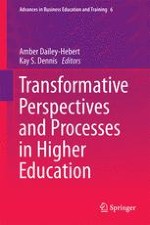2015 | OriginalPaper | Chapter
5. Heutagogy, Technology, and Lifelong Learning for Professional and Part-Time Learners
Authors : Lisa Marie Blaschke, Stewart Hase
Published in: Transformative Perspectives and Processes in Higher Education
Publisher: Springer International Publishing
Activate our intelligent search to find suitable subject content or patents.
Select sections of text to find matching patents with Artificial Intelligence. powered by
Select sections of text to find additional relevant content using AI-assisted search. powered by
